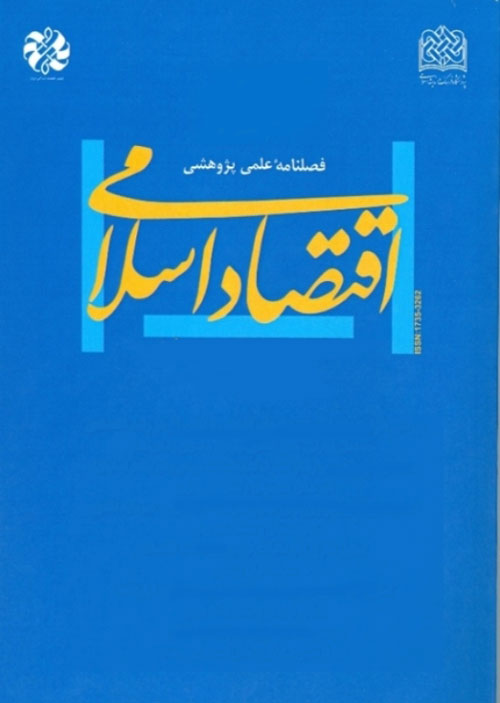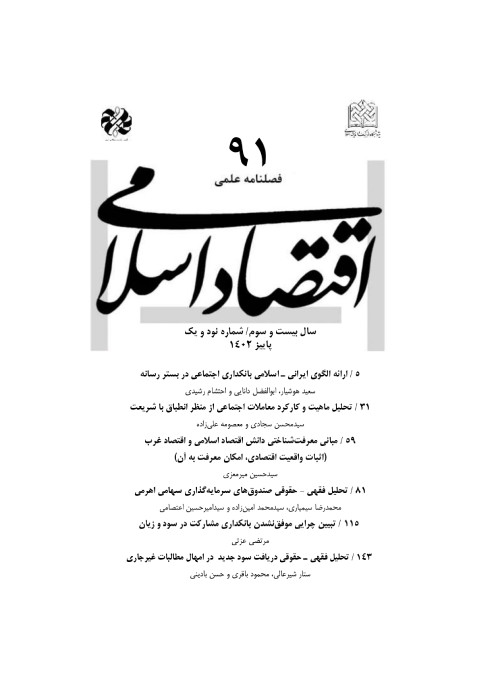فهرست مطالب

فصلنامه اقتصاد اسلامی
پیاپی 59 (پاییز 1394)
- تاریخ انتشار: 1394/10/25
- تعداد عناوین: 7
-
-
صفحات 5-32
-
صفحات 65-94
-
چکیده عربی مقالاتصفحات 187-194
-
Pages 5-32This article focuses on the relationship between Islamic economics and economic jurisprudence. Thus، after reviewing the discussion in the scientific literature of the Sunnis and Shia، the paper explains the structure of economic jurisprudence and Islamic economics definition and explanation of its structure and the relationships between them. Today، Islamic economics is defined in three branches: (1) Islamic economic school، (2) Islamic economic system and (3) Islamic economic science. This article after defining each of the three branches continues the discussions in three sections with titles: economic jurisprudence and economic school of Islam، economic school and economic system of Islam، economic school and Islamic economic science. By comparing the definitions and rational analysis indicated that the economic jurisprudence has influences on each of the three levels and is influenced by all three.Keywords: Economic jurisprudence, Economic school of Islam, Economic system of Islam, Islamic economic science
-
Pages 33-64Holding a special and limited view about human, the conventional human development considers human’s aims at fulfilling the material needs and achieving the relative comfort; although it disregards the spiritual aspect of human. Islamic consideration for this aspect influences the material progress of human in individual and social arena. According to the logic and standard of choosing criteria and the principles of human development from Islamic perspective, this research deals with explanation about criterion for dignity and deliverance and its role in human development through using descriptive-analytical method. Based on the Islamic doctrines, three indexes of “accepting the Vilayah”, “peace of mind” and “observing the moral respects” as criterion for dignity and deliverance are presented and in order to measure the quantity of each of them, some indicators were suggested. In order to meet the material need, criterion for earning livelihood is needed. To meet the rational need, criterion for obtaining science and knowledge is required. To meet the mental need, the criterion for practicing religiosity is needed.Dignity and deliverance as a forth criterion covers the above-mentioned criteria like an umbrella and also protects human dignity in all aspects.Keywords: Criterion, index, Iindicator, Hhuman development, Prosperity, Dignity, deliverance
-
Pages 65-94Economic growth and investment activity is not possible without accepting the risk. On the other hand, too much risk taking is one of the barriers of investment, and could lead to an economic slowdown and a lack of incentives for participation in the various fields of investment. One of the principles of the Islamic faith effort to avoid shaky transactions between individuals and avoid the aggressive risk is the ban on Gharar in trading activity. Gharar means an element of uncertainty in a contract that can be put at risk one of the parties in transaction. This concept is very similar to the concept of financial risk that is an uncertainty about the real return or other important variable in the future. If the financial risk is defined as future uncertainty about deviation from expected earnings or expected outcome, then the relationship between financial risk and Gharar standard, would be contradictory. But if the risk in a general meaning equals any kind of uncertainty or risk in investment, then the relationship between risk and Gharar, is absolute general and specific. This research exploit from descriptive and analytical methods to explain relationship between risk and Gharar.Keywords: Risk, Uncertainty, Gharar, Absolute General, Specific
-
Pages 95-128This paper is trying to analyze and explain the effect of the belief in life after death and that life satisfaction on human’s time allocation, by giving the framework compatible with religion.This article is considered as an attempt of theorizing and its research method is logical, mathematical, geometric analysis.In this paper, how to allocate time to works and how to affect the faith and wage on time allocation and other issues in this context is explained.The main finding of this study is the explanation of employing the assets -both money and time- by human to achieve satisfaction of God. These two are considered as substitutes in this context.Increases in Wage level have a negative effect on the allocation of time for God and has a positive effect on the allocation of money for God, but increases the accumulated assets allocated to the path of God.Keywords: Time Allocation, Work, Acts for God, Life after Death
-
Pages 129-155The delay payment penalty is one of the criticized challenges of usuryfree banking in Iran. The Jurisprudential, legal and economic challenges necessitates research about substitute solution for this subject. “Can we find a solution by Jurisprudential capacities that efficiently solve delay payment penalty challenges?”is the main question of this research. This article strives that through an analytic- descriptive method and benefiting from Shia (Imamiyah) jurisprudence, it can prove this hypothesis that: "compound solution of banking awards and legal penalties (Tazir) is a good policy package for solving the delay payment penalty challenges." The using of the policy package which is supported by hortative and punitive instruments and is backed by information system of facilities records can be a substitute solution for this subject. This solution has the same advantages of the other solutions with the difference that it minimizes their problems.Keywords: Bank Claims, Delay Payment Penalty, Legal Penalties, Islamic Banking
-
Pages 157-185This article is an effort to examine the Profit Maximization of bank according to Iranian "Law for Usury (Interest)-Free Banking Operations", which is close to the Islamic Banking fundamentals.According to the goals of an enterprise in Islamic economics including Islamic bank and employing the nonparametric test of Weak Axiom of Profit Maximization (WAPM), this article deals with the investigation on the activity of a Bank as a sample. The result is the inefficiency of the mentioned bank in the ten-year period (1383-1393). At the end, the article analyzes this inefficiency.Keywords: Islamic Banking Model, the aims of Islamic BankingModel, Profit Maximization of Islamic bank, Weak Axiom of Profit Maximization (WAPM), nonparametric test


